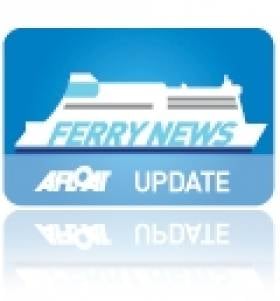Displaying items by tag: Rosslare Port
According to the vessels survey schedules, RV Celtic Explorer had today completed fisheries demersal surveys which started in Galway on 23 September. The near fortnight-long survey was conducted in the ICES area VI, under the direction of chief scientist, Dave Stokes.
On Friday she embarks on a herring acoustic survey which is to take place in the Celtic Sea and the south-west. This survey will be under chief scientist Ciaran O'Donnell and is to de-mobilise in Cork on 27 October. To read more about her 2011 survey programme click HERE.
Across Dublin Bay in neighbouring Dun Laoghaire, the 31m RV Celtic Voyager is currently nearing the end of a month-long hydrography survey of the Celtic Sea. The survey had started in Howth Harbour on 17 September under chief scientist Kevin Sheehan. For the time-being she remains moored in Dun Laoghaire prior to resuming survey work which will continue until the vessel de-mobilises in Rosslare in mid-October. To find out more about her remaining surveys for this year click HERE.
On the surveys outlined they are conducted on behalf of Marine Institute scientists, though the vessels are also allocated ship-time for use of third parties. These include government departments and agencies, universities, research institutes and industry. For further information on the research vessels, survey schedules etc can be found by visiting: www.marine.ie/home/Research+Vessels.htm
New Vessel on the Horizon for Celtic Link Ferries
With an increased capacity of nearly 1,000 passengers accommodated in 428 cabin berths, the vessel will offer a wider choice of bars, restaurents and childrens' play area compared to the current route ro-pax Norman Voyager, which like her successor was built by Italian shipbuilders Visentini. The 25-knot replacement ship will have 2,285 lane metre space for 800 cars or 150 freight vehicles.
Celtic Horizon becomes the first vessel to incorporate the companies name since foundation in 2005 when the freight-ferry Diplomat started operations. In recent years the company has secured the contract to import new trade vehicles from French manufacturers.
Before the newcomer makes her Autumnal debut, the 2006 built vessel is currently operating as Cartour Beta while on charter to Caronte and Tourist's (C&T) Salerno-Messina service in Sicily. To read more click here.
As for the Norman Voyager, she first entered as a newbuild in 2008 for LD Lines weekend operated Rosslare-Le Havre route, subsequently transferred to Cherbourg. LD Lines first foray into the Irish market was short-lived as the ro-pax was sub-chartered to Celtic Link Ferries the following year, though the French company are to transfer the vessel to their Marseilles-Tunis route in November.
- Diplomat
- Celtic Link Ferries
- Ports and Shipping
- RosslareCherbourg
- Norman Voyager
- Visentini
- RoPax
- FreightFerry
- Ferry news
- LD Lines
- Cartour Beta
- Caronte and Tourist
- Visentini ropax
- RosslareLe Havre
- SalernoMessina
- MarseillesTunis
- Irish ferry market
- IrishFrench ferry services
- Irish ferry sector
- Irish Ferries
- RoPax Norman Voyager
- Rosslare Port
- Rosslare Europort
- French trade vehicles
- Citreon
- Peugoet
- Renault

























































